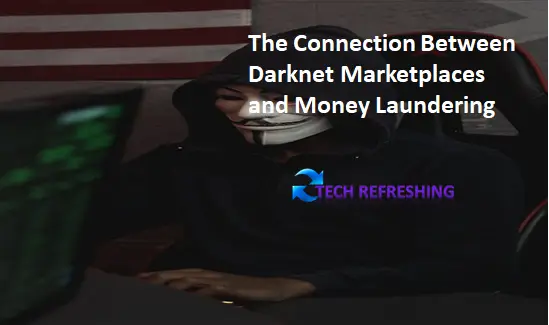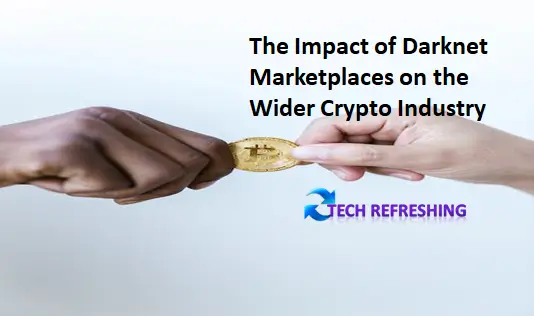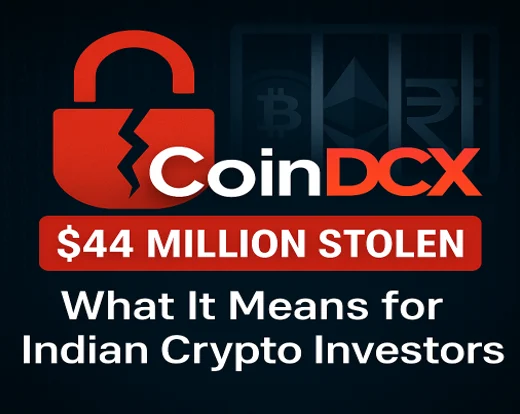
Darknet marketplaces are internet-based platforms that function within the dark web, solely accessible through specialized software or configurations. These marketplaces are frequently linked with illicit undertakings, such as vending drugs, weapons, counterfeit products and stolen information. Although certain marketplaces are managed by individuals, others are overseen by criminal organizations or hacking collectives.
Overview of the Impact of Darknet Marketplaces on Money Laundering:
The rise of darknet marketplaces has caused a considerable effect on the practice of money laundering, primarily because of the growing employment of cryptocurrency as a payment method. Cryptocurrency transactions’ anonymity makes it an ideal instrument for money laundering since it enables people to transfer funds across borders without leaving any trace. Darknet marketplaces have facilitated the process of money laundering for criminals by providing an avenue for anonymous transactions and enabling them to transform unlawful funds into cryptocurrency.
The emergence of darknet marketplaces has considerably influenced the realm of money laundering, with cryptocurrency playing a fundamental role in driving these unlawful activities. This blogpost aims to examine the correlation between darknet marketplaces and money laundering, the implications of these activities on the broader cryptocurrency industry and the potential trajectory of cryptocurrency-related money laundering.
Darknet Marketplaces and Cryptocurrency

Explanation of How Darknet Marketplaces Operate:
Dark web marketplaces function within the dark web, a part of the internet that cannot be indexed by standard search engines and necessitates specialized software or configurations to access. These marketplaces are generally hosted on anonymous servers and are built to enable anonymous buying and selling of goods and services. They are usually categorized based on specific areas such as drugs, weapons or stolen data.
Typically, users are required to download specialized software, such as the Tor browser, to access a darknet marketplace, which permits anonymous browsing of the dark web. After gaining entry to the marketplace, users can peruse the range of goods and services on offer and conduct transactions using cryptocurrency.
Role of Cryptocurrency in Darknet Marketplaces:
Due to its convenience and anonymity, Cryptocurrency has become the preferred payment option for several darknet marketplaces, in contrast to conventional payment methods such as bank transfers or credit cards, where personal information or identification is required. Cryptocurrency transactions allow users to remain anonymous without revealing any personal information.
The anonymity offered by cryptocurrency makes it a perfect instrument for illegal activities on darknet marketplaces, such as selling stolen data or drugs. It also poses a challenge for law enforcement agencies to trace and investigate such activities.
Common Types of Cryptocurrency Used on Darknet Marketplaces:
The extensive acceptance and ease of use make Bitcoin the most frequently used cryptocurrency on darknet marketplaces. Nonetheless, other cryptocurrencies, including Monero and Zcash are gaining momentum because of their emphasis on privacy and anonymity.
Advanced encryption techniques are utilized by these privacy-oriented cryptocurrencies to prevent the tracking of transactions to their source, making them a desirable choice for individuals seeking to engage in illegal activities on darknet marketplaces.
The Connection Between Darknet Marketplaces and Money Laundering

How Darknet Marketplaces Facilitate Money Laundering:
Money laundering is made possible by darknet marketplaces as they offer a platform for individuals to convert illegal funds into cryptocurrency, which can be used anonymously to buy goods and services. The use of cryptocurrency enables individuals to transfer funds across borders without leaving a visible digital footprint, presenting a challenge for law enforcement agencies to track and investigate such activities.
Darknet markets give people a venue to participate in unlawful activities including the selling of illegal goods or stolen information, which can bring in substantial amounts of money from crime. People can produce significant sums of bitcoin by selling these products and services on darknet markets, which can then be used to launder money.
The Anonymity of Cryptocurrency Transactions and Its Impact on Money Laundering:
The capacity to transfer funds across borders without leaving an apparent digital trail is made achievable by the anonymity provided by cryptocurrency transactions, significantly influencing the realm of money laundering. The lack of a transparent record of the transaction or the parties involved poses a challenge for law enforcement agencies to trace and scrutinize these activities.
Cryptocurrency’s anonymity has established it as an ideal instrument for money laundering since it enables individuals to transform illegal funds into cryptocurrency, which can be utilized anonymously to buy goods and services. This complicates law enforcement agencies’ ability to trace the funds’ source or to identify the persons participating in the transaction.
Examples of High-Profile Money Laundering Cases Involving Darknet Marketplaces and Cryptocurrency:
Numerous high-profile instances of money laundering have occurred, involving darknet marketplaces and cryptocurrency. The Silk Road case is one of the most renowned examples, in which the darknet marketplace’s founder was found guilty of money laundering and sentenced to life imprisonment.
Another case in point is the shutdown of the darknet marketplace AlphaBay by law authorities after its founder was detained. According to estimates, the website enabled over $1 billion in unlawful activities, a large portion of which was cleaned up using cryptocurrencies.
These cases emphasize the notable influence that darknet marketplaces and cryptocurrency can have on money laundering, underscoring the necessity for sustained vigilance and regulation in the cryptocurrency industry.
The Impact of Darknet Marketplaces on the Wider Crypto Industry

Increased Scrutiny from Regulators and Law Enforcement:
The growth of darknet marketplaces has resulted in heightened scrutiny from regulatory bodies and law enforcement agencies, alarmed about the possibility of cryptocurrency’s utilization in illegal activities, including money laundering and financing terrorism. This increased scrutiny has prompted several regulatory modifications and policies aimed at tackling these concerns, such as Know Your Customer (KYC) and Anti-Money Laundering (AML) requirements.
Moreover, law enforcement agencies have escalated their endeavors to track and scrutinize cryptocurrency-linked crimes, such as the utilization of cryptocurrency to purchase illicit goods and services on darknet marketplaces.
Changes in Cryptocurrency Regulations and Policies:
The augmented inspection from regulatory and law enforcement agencies has resulted in various modifications in cryptocurrency regulations and policies. Numerous countries have enforced new laws and regulations regulating the utilization of cryptocurrency, which comprises the necessity for cryptocurrency exchanges to register with regulators and implement KYC and AML measures.
Many cryptocurrency exchanges have voluntarily implemented stricter security measures and increased transparency in an effort to address concerns about the potential for cryptocurrency to be used in illegal activities.
The Impact on the Reputation of the Wider Cryptocurrency Industry:
The correlation between cryptocurrency and darknet marketplaces has negatively affected the reputation of the broader cryptocurrency industry. Several people associate cryptocurrency with illegal activities and regard it as a medium for criminals to launder money and elude detection.
This unfavorable repute has resulted in increased difficulties for the broader cryptocurrency industry to attain mainstream acceptance, along with escalating scrutiny and regulation from governments and financial institutions. Nonetheless, several experts opine that amplified regulation and supervision could ultimately be beneficial for the industry by enhancing transparency and decreasing the likelihood of misuse.
The Future of Darknet Marketplaces and Cryptocurrency-Related Money Laundering

The Potential Impact of Technological Advancements on Darknet Marketplaces:
The evolution of technology, including the emergence of decentralized marketplaces, has the potential to considerably affect the fate of darknet marketplaces. Decentralized marketplaces enable peer-to-peer transactions without the necessity of a centralized platform, thereby making it more challenging for law enforcement authorities to track and probe unlawful activities.
In addition, advancements in privacy-enhancing technologies, such as zero-knowledge proofs and secure multi-party computation, could further enhance the anonymity of cryptocurrency transactions, making it even more difficult for law enforcement agencies to trace the origin of funds.
Predictions for the Future of Cryptocurrency-Related Money Laundering:
With the continued rise of mainstream acceptance and adoption of cryptocurrency, it is probable that the exploitation of cryptocurrency for money laundering will persist. Nonetheless, intensified regulation and supervision, along with technological progressions, could make it more arduous for criminals to employ cryptocurrency for illicit activities.
Experts predict that the development of regulatory sandboxes and collaboration between law enforcement agencies and the cryptocurrency industry could help to mitigate the risks of cryptocurrency-related money laundering. However, it is likely that new challenges and risks will emerge as the industry continues to evolve.
The Need for Continued Vigilance and Regulation in the Cryptocurrency Industry:
To mitigate the risk of cryptocurrency being utilized in illegal activities, sustained caution and regulation in the cryptocurrency industry are imperative. This encompasses enforcing KYC and AML measures, as well as enhancing transparency and cooperation between industry players and law enforcement agencies.
It is crucial for regulators and policymakers to maintain a balance between encouraging innovation and safeguarding consumers and the financial system’s integrity. Collaboration between the cryptocurrency industry and regulators can play a vital role in ensuring legitimate use of cryptocurrency while minimizing the risks of money laundering associated with it.
Conclusion
The emergence of darknet marketplaces has made a substantial impact on money laundering related to cryptocurrency, underscoring the importance of sustained vigilance and regulation within the cryptocurrency sector.
Summary of Key Points:
In this article, we have delved into the link between money laundering and darknet marketplaces, as well as the broader effects of these marketplaces on the cryptocurrency sector. Our analysis has encompassed the role of cryptocurrency in these marketplaces, which exploit their unregulated and anonymous nature to enable money laundering. Furthermore, we have assessed the consequences of heightened regulatory and law enforcement oversight on the cryptocurrency industry and made forecasts for the trajectory of money laundering pertaining to cryptocurrency.
Final Thoughts and Recommendations:
Based on the information presented, it is evident that the hazards associated with money laundering related to cryptocurrency are noteworthy and cannot be disregarded. Even though technological advancements and the increasing acceptance of cryptocurrency have numerous benefits, they also pose novel challenges and risks. It is crucial for the cryptocurrency industry and regulators to collaborate and tackle these challenges to ensure the legitimate use of cryptocurrency.
As a final suggestion, we propose that those involved in cryptocurrency-related activities take measures to shield themselves from the hazards of money laundering. This comprises of adopting stringent Know Your Customer (KYC) and Anti-Money Laundering (AML) practices, collaborating with credible cryptocurrency exchanges and service providers, and staying up-to-date with the newest regulatory updates in the sector. By following these steps, we can assist in upholding the soundness of the cryptocurrency industry and reduce the possibility of its exploitation.
Disclaimer
The information presented in this Blogpost is solely for educational and informative purposes and should not be misconstrued as investment, financial or legal advice. Cryptocurrencies are a highly unstable and speculative market and their worth is susceptible to substantial fluctuations. Therefore, it is advisable to conduct personal research and seek counsel from qualified experts before making any financial decisions.







